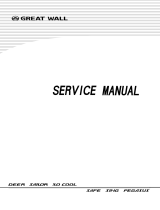
Installation Instructions
LGMM-EXT-R
SW3-1022 - v1
1. Introduction
LGMM-EXT-R range is an installation kit with an extended mounting bush and sealing pad for the L[G]M[X]M[X] range of antennas. This kit has been
specifically designed to enable the antenna to be fitted on ribbed panels and uneven surfaces. The kit (depending on version) contains a plain or slotted
extension bush with slotted nuts and washers, a silicone foam centre sealing pad and a semi-closed cell EPDM foam pad to seal the installation and to shape
itself to an uneven mounting panel. This installation guide must be read in conjunction with the full installation instructions for the relevant version of the
antenna being installed.
2. Select A Suitable Mounting Location
Select a mounting location and ensure that there is adequate clearance under the mounting panel. Measure to check for central position if applicable. The
area where the mounting hole will be made should be as flat as possible and must able able to accommodate a 1 inch (25mm hole). When fitting the antenna
to a ribbed panel where the raised ribs are wider than 44mm (1.7 inches), the antenna should be mounted on the highest part of the rib if possible. Note that
an absolute minimum compression of >5mm (0.2”) is required for the central sealing pad, so care must be taken if the antenna is fitted in a gulley on a ribbed
roof. Take care to avoid mounting the antenna in close proximity to other objects on the mounting panel.
4. Fitting the Antenna
Remove the protective backing from the underside of the antenna, feed the coaxial cables through the smaller (central) EPDM pad, pass the pad over the
extension bush and firmly push on to the base of the antenna, to ensure adhesion. Feed the antenna cables though the larger (outer) sealing pad, push the
outer pad into position over the central pad and adhere to the adhesive pad on the base of the antenna. Feed the coaxial cables through the panel and
remove the remaining protective backing from the central sealing pad. Position the antenna over the hole, ensuring correct orientation and press down firmly
to adhere. Assemble the nut and washer from the underside and tighten to 3-5Nm (2.2-3.6 ft lbs). Do not over-tighten as this may damage or distort the
mounting panel.
Note: Ensure that the antenna does not rotate during the final tightening process, as this could compromise the integrity of the sealing. The outer foam pad
has a semi-closed cell structure and will only seal if adequately compressed.
3. Prepare and Make A Hole
Assemble the extension bush to the antenna, tighten fully with a spanner, taking care not to damage the external threads of the bush. Note, if using the slotted
bush version, ensure that the antenna cables are not trapped or damaged during the assembly and installation process. Mask the panel area around the hole
position to protect the paintwork and check for under-panel clearance to the headliner (if applicable). Drill a pilot hole, and then increase the hole diameter to
1 inch (25mm), ensuring that drill/cutter bit does not make contact with the headliner. Clean the area around the hole, carefully removing any burrs and all
swarf. Apply some petroleum jelly or paint around the hole to prevent corrosion.
5. Complete the Installation
Complete the installation, commission and test procedures as detailed in the full installation instructions for the antenna being installed.
REMOVE LINER FROM ANTENNA ADHESIVE PAD. APPLY LARGE SEALING PAD TO ANTENNA CENTRALLY. REMOVE LINER FROM ONE SIDE OF
CENTRE SEALING PAD AND APPLY TO ANTENNA BASE.








